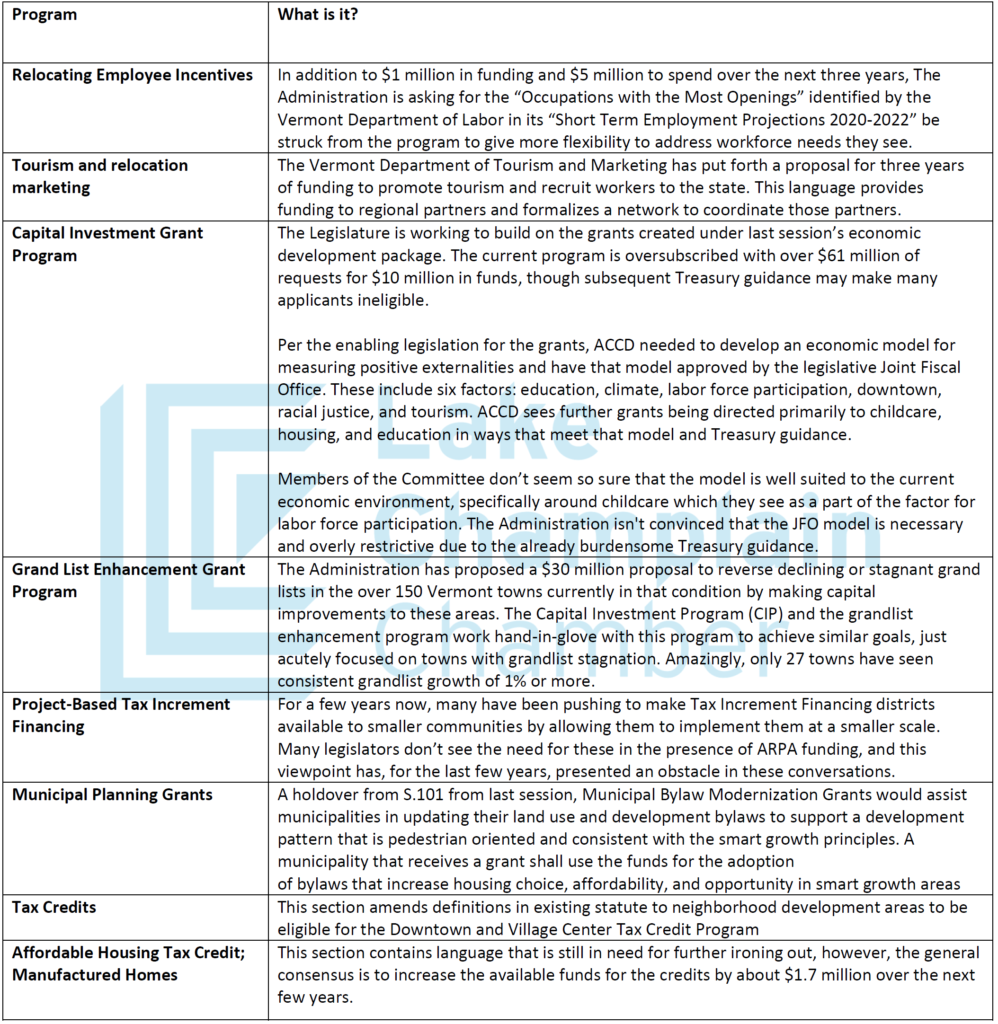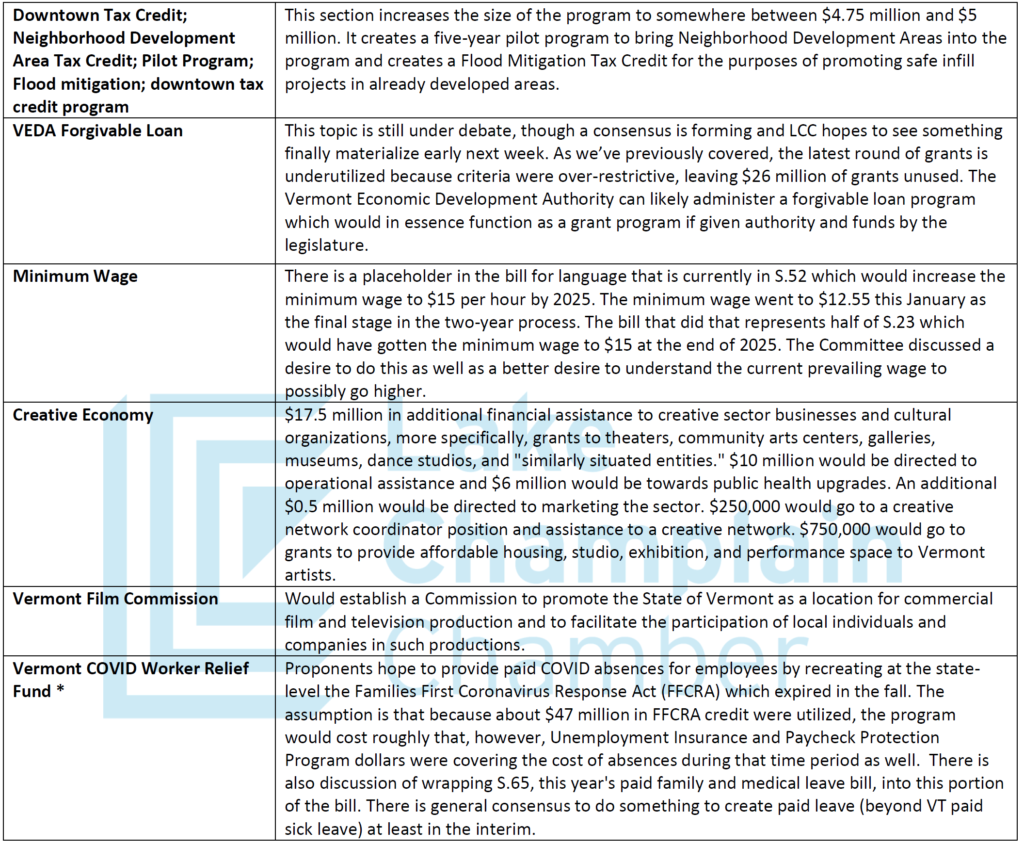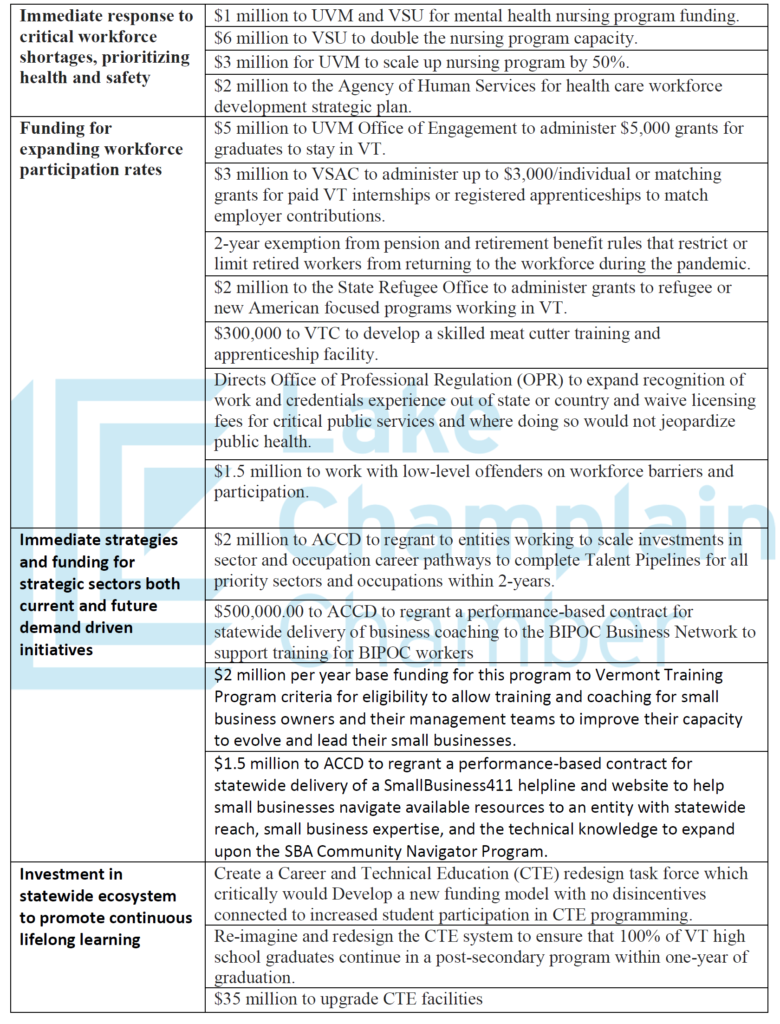Thank you to this week’s sponsor of our Advocacy Update:
February 11, 2022
As we come to the end of week six of the legislative session, the overall contours of the large fiscal picture are becoming more clear. This week the Budget Adjustment Act passed the Senate and committees are hard at work on omnibus bills that would distribute much of the remaining federal funding the state has received. Last session, the Legislature spent about $506 million in federal aid before adjourning. This year it is looking like the Legislature will appropriate about $700 million before the final fall of the gavel between the BAA, this year’s budget, and the omnibus bills.
In this week’s update:
- Join LCC Monday for our second legislative breakfast, focussing on benefits cliffs
- Omnibus Economic Development bill now in one place
- Omnibus Workforce Bill takes its form
- Corporate tax reform edges forward
- Unemployment Insurance for nonprofits gets more attention
- Housing conversations roundup
- The Laundry List
Join LCC Monday for our Second Legislative Breakfast, Focussing on Benefits Cliffs
We had a fantastic legislative breakfast on the 31st. With our next breakfast, we will switch from networking to hearing from experts on benefits cliff issues. What is a benefits cliff? Here’s a quick primer.
Breakfast Number 2 – Monday, February 14th (Valentines Day) – 8:00 – 9:15 a.m.
Join LCC, leadership from the Leap Fund, and analysts from the Atlanta Federal Reserve to discuss addressing benefits cliffs. Read more about this work in the New York Times.
LCC hopes to pull stakeholders together in the coming months to focus on three goals;
- One: break down the “black box algorithm” that is at the confluence of our benefits and tax system which drives some employees over a benefits cliff with devastating consequences or has them park at the cliff in fear that increased or enhanced workforce participation will leave them worse off than before.
- Two: help employers work through that newly demystified blackbox algorithm to best assist employees in avoiding the two scenarios just described.
- Three: bring forward meaningful policy reforms that state government works for, and is approachable enough to, everyday Vermonters.
Breakfast Number 3 – Monday, March 14th – 8:00 – 9:15 a.m.
As the legislature enters the home stretch, check-in with the Governor, Speaker of the House, and Senate President Pro Tem.
Special thanks to the sponsor of our Legislative Breakfast Series:
Quick Survey
Unsurprisingly, national data is showing a huge spike in employee absences from work due to illness or medical problems. We’re fielding inquiries about Vermont’s experience. Please answer this brief four question survey:
Omnibus Economic Development Bill Now in Print
The first draft of the Omnibus Economic Development Bill was released this week and is an expansive draft that spans everything from recovery grants to a paid family leave proposal, as we’ll outline in this update. A cursory calculation of the entire package put it at about $150 million, though this bill has been described as everything but the kitchen sink. LCC’s Government Affairs Manager testified on the bill’s recovery grant portion and spoke to the unmet need for support in the Vermont economy as well as the impacts of inflation. You can watch the testimony here. The VEDA program is coming together in a way that is satisfactory to most stakeholders, while there are still some concerns.
During the testimony, the Chair of the Committee cited a report from the State Auditor which erroneously claimed that Vermont businesses have received a larger portion of federal assistance than other aspects over other Vermont needs. The report had not been made available until after our team had testified. In our opinion, the Auditor has tried to artificially inflate the amount of assistance by including assistance to community health centers, training for EMS staff, aid to the state college system, and even money to stabilize adult day providers, among other things. Furthermore, the Auditor continually misrepresents the Paycheck Protection Program as exclusive assistance for businesses, whereas we consider the program as a parallel track to divert some employees from the Unemployment Insurance program, with upwards of 75% of all PPP funds going to employee’s wages.
Here is a comprehensive look at the bill.


Additionally, much of the conversation around S.65, which would create a paid family and medical leave program has been in the context of this bill.
LCC expects to provide more input to the Committee in the coming weeks. One item we’d like them to consider is how to fully leverage the venture capital we have in the state to attract or retain dollars and talent. We have heard directly from our stakeholders who’ve in recent years shifted an ever-growing proportion of their investment outside of Vermont to utilize other states’ incentives. From 2010 to 2020, Vermont logged $100 million in venture capital, with these private investments generating countless skilled jobs aligned with the demands of a 21st-century economy and Vermont values. However, compared to other regions, Vermont lags woefully behind, ranking 43rd in the nation for venture capital in recent years. The biggest competitor eating our lunch in our region is Portland, Maine. Maine has a population of only about twice that of Vermont’s, yet saw three times the amount of investment and continues to grow largely attributed to its pro-investor and startup tax incentives.
Omnibus Workforce Bill
The House Committee on Commerce and Economic Development walked through the draft text of H.703 a short-form bill which represents the makings of the omnibus workforce development bill which is the product of about five weeks of testimony from stakeholders. The bill represents at least $61 million (excluding revenue expenditures) in workforce investments spanning higher education, career technical education, and internships. Here’s a summary of some of the larger components of the bill:

Corporate Tax Reform
The Senate Finance Committee has continued their work with corporate tax reform and it is readily apparent that they will not be continuing with the cloud tax language as they progress the final version of the legislation. The Vermont Department of Taxes provided the Committee with analysis showing the impact to the top 50 companies in the state with the conclusion that those in-state, with payroll and wages, who are smaller, will benefit most from the combined package.
Senate Finance is grappling with a large change that the House Ways and Means Committee spent a considerable amount of time putting together. The crux of the single sales factor conversation is foundational in this modern economy; the best reflection of where you earn income is where you are making your sales rather than a combination of sales, property, and payroll. Those who have made the investment in payroll and property in Vermont will benefit from this package.
The Committee will also need to contend with the Governor’s dismissal of the changes to the alternative minimum tax. While the change in the alternative minimum tax has been compared to other states, such as New York, that state has another alternative minimum tax bracket for less liability for manufacturing and emerging technologies because they are making larger investments in payroll and property that have subsequent taxes.
Unemployment Insurance Notification
As we’ve previously covered, nonprofits’ unique situation within our unemployment insurance system has come under some scrutiny this year. This week, the House Commerce Committee looked at H.29 which would require nonprofit employers with less than four employees and thereby not required to provide unemployment insurance to notify any employees of ineligibility for unemployment insurance. The bill also contemplates requiring these nonprofits to provide unemployment insurance, which is a more difficult conversation, as the Committee does not feel they have enough data.
Housing Conversation Check-in
We published a deep dive into housing a few weeks back that covered housing bills and Act 250 reform. This week, we’ll check in on some of the elements we outlined in that update.
In the Senate Committee on Economic Development, Housing, and General Affairs, they are developing an omnibus housing bill. Just as the other omnibus bills are expansive and might not reflect what comes out of the committee, S.226, the omnibus housing bill is a large piece of legislation that includes proposals ranging landbanking, incentives to convert commercial properties to residential use, assistance for employers to house employees, and the “homeless bill of rights.” Some of the elements of this housing discussion are also duplicated in the omnibus economic development bill. Much of the Committee time has been focussed on “missing middle” housing programs which the Committee is still trying to grapple with.
The Senate passed S.210, the rental registry, this week by a vote of 20 to 9 which sets the tone for a potential coming veto of the legislation. However, this version of the bill contains funding and language around the Vermont Housing Improvement Program (VHIP) to sour prospects of a veto. Yes, the Governor did veto this bill previously with VHIP in it, however, the Administration was able to stand up the program on their own due to language being in the budget as well, something the Legislature is savvy to now. This adds a layer of complexity to the entire housing conversation moving forward.
The Act 250 reform conversation continues on with the House mostly focussing on the Board and appeals structure and the Senate focussing on everything else. The Senate worked this week on expanding the number of Priority Housing Projects possible in designated areas, as was seen in H.511 along with other aspects of the bill.
Two larger trends have hit a tipping point this week and seem to have close to ubiquitous consensus. First, folks are rallying around allowing more development and incentives for infill in areas that are previously developed yet are in flood zones. Second, most everyone seems to be on board with lifting the cap for Priority Housing Projects.
Laundry List
For those new to our advocacy updates, the “laundry list” is where we give quicker updates and highlight interesting news. There are about 624-hours of legislative committee time each week and then additional conversations outside of committee, local news, and federal conversations. With all that, not everything makes it to a full newsletter item. Have feedback for us? Email [email protected].
- Find links to our past advocacy updates from this legislative session: Week 1, Week 2, Week 3, Week 4, Week 5.
- While the House has been legislating in-person, with a hybrid option, for a few weeks now, the Senate will be joining them in March, as they return from the Town Meeting week recess. What is still unclear is how welcome public participation is, with many lobbyists staying remote or visiting the State House very judiciously.
- The Governor has vetoed H.157, the contractor registry citing concerns that it will hurt many small businesses.
- Here is the latest draft of the Clean Heat Standard we covered last week. This version contains language around a registry for fuel dealers in the state.
- The $363 million Budget Adjustment Act (BAA) passed the Senate this week with language that would satisfy the desire of the Governor and his party to hold in reserve $25 million in ARPA funding for infrastructure needs if general fund growth continues. We also covered last week an amendment that sought to add prevailing wage requirements similar to Davis-Bacon to federally funded state infrastructure projects.
- H.447 passed the House this week and would require employers to provide unpaid leave if an employee needs to attend a court proceeding related to a protective order or if they, or a family member are the alleged victim of crime. Alleged is a keyword, as this legislation existed for individuals before, however, the absence of this word excluded most victims.
- South Burlington went ahead this week with their land development regulations which would substantially restrict the available land for addressing the current housing crisis. You can read more via VTDigger here. LCC and others have advocated that the best thing South Burlington can do for our climate and the environment is to embrace their status as a city and develop more housing within a short distance to jobs and services.
- Tangentially advocacy-related, the application for LCC’s Leadership Champlain program is open. The program is a great way to prepare an employee for their next big step and the program counts some of the state’s biggest power brokers among its alumni.
Concerned or need to learn more about anything in this newsletter? Email our team at [email protected].
We look forward to working with you.
Sincerely,
The Lake Champlain Chamber Advocacy Team
Help us seek economic opportunity for all Vermonters. Support our advocacy work.
Become a member of the Lake Champlain Chamber or connect with our advocacy team to learn more about sponsorship opportunities

